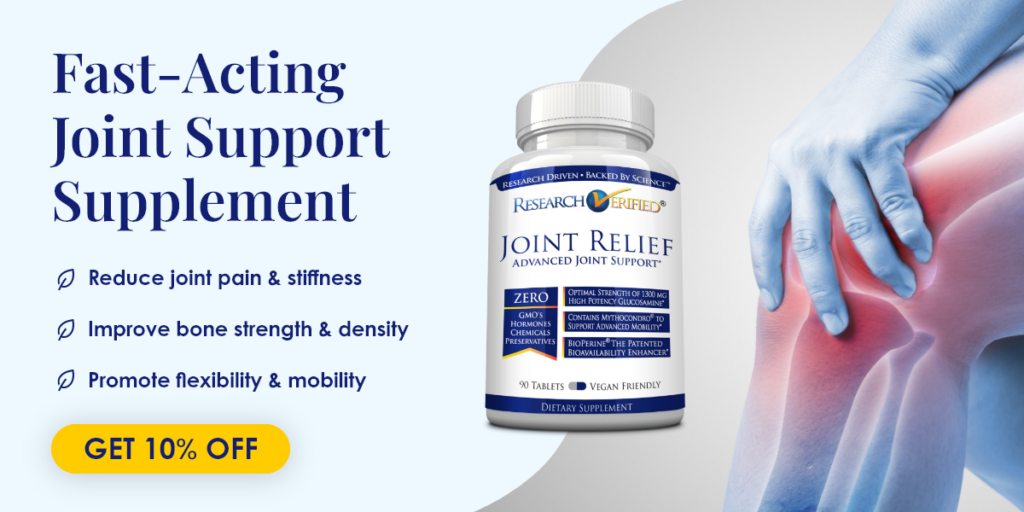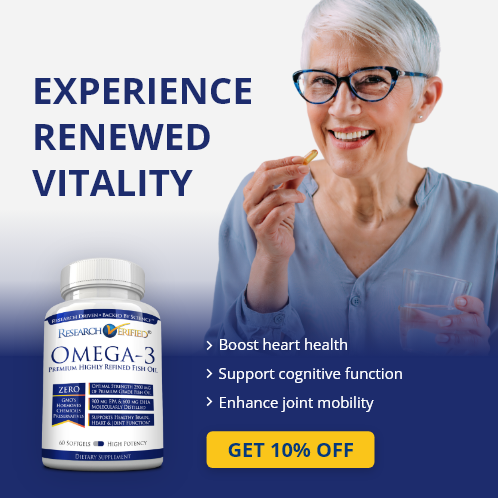September is healthy aging month – but what does that mean? At Research Verified, we choose to understand healthy aging as maintaining good function into old age. Although genetics and youthful choices may make disease-free aging unattainable for some, we can still manage our health and continue to thrive. Research Verified is here to support you on your journey through aging. Keep reading to discover our top actionable tips for staying healthy as you age.
1. Keep Moving
Physical activity is one of the most effective ways to age well. Studies show that regular exercise not only improves cardiovascular health but also helps maintain muscle mass, flexibility, and bone density—all of which decline with age (1, 2). Exercise also has mental health benefits, helping to reduce anxiety and depression, while enhancing cognitive function (3).
Tip: Aim for a mix of strength training, cardio, and flexibility exercises. Resistance training is particularly important as it helps maintain muscles and bones, while aerobic exercises like walking or swimming improve heart health. Even starting with a few extra minutes of walking a day can have an impact on your health and help you to be more active in the future.
💡Did you know that the record holder for the fastest 5K in the 95-99 age group didn’t start getting active until he was 60? (4, 5) From doing laps around his basement, to setting world records, it was getting active and staying active that made all the difference for Roy Englert. So what are you waiting for?
Is joint pain keeping you from getting active? Don’t let joint pain stop you from living your best life. Our Joint Relief supplement is designed to help reduce inflammation, boost comfort, increase mobility, and support a lifestyle with active joints. Learn more about Research Verified Joint Relief.

2. Be Happy
Happiness goes beyond just feeling good—it has a profound impact on your physical health (6). Research shows that individuals who experience more positive emotions tend to live longer, have healthier hearts, and exhibit lower levels of chronic inflammation, which is a known contributor to many age-related diseases (7). Additionally, a strong sense of purpose and meaningful social connections are linked to reduced stress and improved overall well-being.
Tip: Do things that bring you joy, whether that’s spending time with loved ones, pursuing hobbies, or practicing mindfulness. Make an effort to nurture your social relationships, as loneliness can negatively affect both mental and physical health. Engaging in physical activity and eating nutrient-rich foods also support emotional well-being, proving that happiness is not just about mindset, but that lifestyle choices matter too.
Do you feel too stressed or overwhelmed to feel happiness? Stress and anxiety can stem from many factors, including nutrition. A well-balanced diet rich in essential vitamins and minerals can help support your emotional health (8). This is why supplements such as Research Verified Anxiety Relief can be effective for improving mood.
>>Learn more about how to stress less with better nutrition
3. Support Brain Health
Cognitive decline is a common concern as we age, but there are steps you can take to protect your brain. For example, brain training games that work on memory and speed may actually improve cognition (9, 10). Additionally, research shows that diets have a large impact on cognitive health. Diets rich in antioxidants and omega-3 fatty acids are believed to slow cognitive decline and protect against neurodegenerative diseases like Alzheimer’s (11, 12). Antioxidants combat oxidative stress, which is a key contributor to cellular aging, while omega-3s support brain structure and function.
Tip: Incorporate antioxidant-rich foods like berries, leafy greens, and nuts into your diet. Consider supplementing with omega-3s (such as DHA and EPA), which have been scientifically shown to improve brain function, memory, and mood. Our Research Verified Omega-3 supplement provides a potent dose of these essential fatty acids to keep your brain sharp as you age.
4. Boost Gut Health
No matter our age, maintaining a healthy gut is essential to overall health. The gut is sometimes referred to as the “second brain” because of its profound influence on overall health, including the immune system, metabolism, and even cognitive function. Research shows that the composition of gut bacteria shifts as we get older, which can lead to digestive issues, decreased immune function, and inflammation (13).
Tip: Consider eating more probiotic-rich foods such as yogurt and sauerkraut, or incorporating a high-quality probiotic supplement into your daily routine. Probiotics help restore balance to the gut microbiome, supporting digestion and immune health. Ingredients like Lactobacillus and Bifidobacterium strains are backed by science for their ability to support gut and immune health. Taking these supplements consistently can help improve nutrient absorption and even combat age-related inflammation.
>>Discover how probiotics support gut health
5. Prioritize Sleep
Sleep quality tends to decline with age, but getting enough restorative sleep is a key component of healthy aging. Studies reveal that poor sleep is linked to a higher risk of heart disease, diabetes, obesity, and cognitive decline (14, 15, 16). Sleep also helps with cellular repair, mental clarity, and emotional balance—making it a vital factor in aging gracefully.
Tip: To improve sleep quality, create a bedtime routine, avoid blue light screens before bed, and consider natural sleep aids such as melatonin or magnesium. Magnesium, in particular, has been shown to improve sleep efficiency by calming the nervous system and promoting relaxation (17). Our sleep supplement, Research Verified Sleep Aid, combines these ingredients for a restful night’s sleep and can help support recovery and overall health as you age.
Conclusion
It’s never too late to start making positive changes for healthier aging. Whether it’s incorporating more movement into your daily routine, fostering emotional well-being, supporting your brain and gut health, or improving your sleep quality, these simple actions can significantly enhance your quality of life as you age.
While supplements aren’t necessarily required for making these changes, supplements can provide an extra boost when needed. At Research Verified, we offer scientifically backed products to complement your health journey. Whether you choose to use our supplements or simply apply these tips, we are here to support you every step of the way.





Comments are closed.